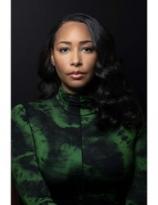Safiya Sinclair
Biography
Safiya Sinclair
Safiya Sinclair was born and raised in Montego Bay, Jamaica. She is the author of the memoir HOW TO SAY BABYLON --- winner of the National Book Critics Circle Award, a finalist for the Women’s Prize in Nonfiction, the OCM Bocas Prize for Caribbean Literature, and the Kirkus Prize.
HOW TO SAY BABYLON was one of the New York Times’s 100 Notable Books of the year, a Washington Post Top 10 Book of 2023, a TIME magazine Top 10 Nonfiction Book of 2023, one of The Atlantic’s 10 Best Books of 2023, a Read with Jenna/"Today" show book club pick, and one of President Barack Obama’s favorite books of 2023. HOW TO SAY BABYLON was also named a Best Book of the Year by The New Yorker, NPR, The Guardian, the Los Angeles Times, Vulture and Harper’s Bazaar, among others, and was an ALA Notable Book of the Year. The audiobook of HOW TO SAY BABYLON was named a Best Audiobook of the Year by AudioFile magazine.
Sinclair is also the author of the poetry collection CANNIBAL, winner of a Whiting Award, the American Academy of Arts and Letters’ Addison Metcalf Award in Literature, the OCM Bocas Prize for Caribbean Poetry, and the Prairie Schooner Book Prize in Poetry. Sinclair’s other honours include a Guggenheim fellowship, and fellowships from the Poetry Foundation, the Civitella Rainieri Foundation, the Elizabeth George Foundation, MacDowell, Yaddo, the Bread Loaf Writers’ Conference, and the Fine Arts Work Center in Provincetown. She is currently an associate professor of creative writing at Arizona State University.
Safiya Sinclair




